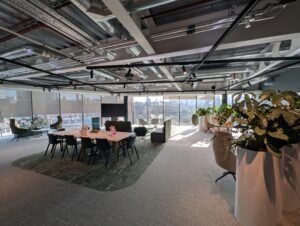Academics from the University of Sheffield are helping to solve food security issues in Oman by creating sustainable greenhouses.
The greenhouses, designed in collaboration with Sohar University in Oman, make use of technology such as hydroponic systems, which use foam instead of soil, and are also able to convert seawater into fresh water using solar power.
These new greenhouses are designed to counter-act local issues such as a lack of water and soil degradation, enabling food to be grown during the harsh Omani summers.
Duncan Cameron, professor of plant and social biology at the University of Sheffield, who helped lead the project, said: ‘Geographically Oman is a difficult country. It reaches highs of 50 degrees in the summer with 65% humidity and struggles to grow anything. This leads to food prices quadrupling in the summer.
‘We had to create a greenhouse that can produce fruit and vegetables in the heat of summer in Oman but can be dropped as a package anywhere and be made bespoke.’
Greenhouse use is already common in Europe where they are used to protect and grow high-value crops such as tomatoes, cucumbers and soft fruits.
However, traditional greenhouses are unsuitable for the Gulf region due to the high amount of energy they need and the region’s extremely hot summer weather.
Scientists have managed to overcome this problem by supporting plants artificially, suspending them from the ground and using foam instead of soil to hold nutrients and water around their roots.
The first new greenhouse designed by the universities, launched in Oman yesterday, will be used as a research facility, showing off its ability to grow fish, vegetables and herbs.
Professor Tony Ryan, a University of Sheffield academic who was present at the launch, said: ‘We’re delighted to be unveiling the first science-led greenhouses to provide fresh local fruit and vegetables.
‘We hope to work with other communities living in some of the world’s harshest climates to develop more greenhouses.’
The greenhouses form part of a larger farming project by the University of Sheffield which aims to feed the world’s growing population.
Researchers hope to be able to tailor the greenhouses to suit the specific needs of any climate or location in the world.













